初中英语八年级动词不定式与动名词专项练习教学教材
中考英语非谓语动词用法系列讲座---动词不定式、动名词及动词过去分词精讲及练习
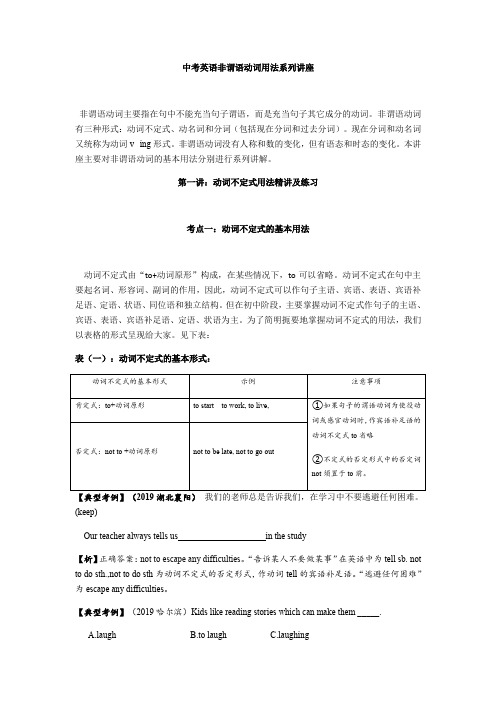
中考英语非谓语动词用法系列讲座非谓语动词主要指在句中不能充当句子谓语,而是充当句子其它成分的动词。
非谓语动词有三种形式:动词不定式、动名词和分词(包括现在分词和过去分词)。
现在分词和动名词又统称为动词v--ing形式。
非谓语动词没有人称和数的变化,但有语态和时态的变化。
本讲座主要对非谓语动词的基本用法分别进行系列讲解。
第一讲:动词不定式用法精讲及练习考点一:动词不定式的基本用法动词不定式由“to+动词原形”构成,在某些情况下,to可以省略。
动词不定式在句中主要起名词、形容词、副词的作用,因此,动词不定式可以作句子主语、宾语、表语、宾语补足语、定语、状语、同位语和独立结构。
但在初中阶段,主要掌握动词不定式作句子的主语、宾语、表语、宾语补足语、定语、状语为主。
为了简明扼要地掌握动词不定式的用法,我们以表格的形式呈现给大家。
见下表:表(一):动词不定式的基本形式:【典型考例】(2019湖北襄阳)我们的老师总是告诉我们,在学习中不要逃避任何困难。
(keep)Our teacher always tells us___ _ in the study【析】正确答案:not to escape any difficulties。
“告诉某人不要做某事”在英语中为tell sb. not to do sth.,not to do sth为动词不定式的否定形式,作动词tell的宾语补足语。
“逃避任何困难”为escape any difficulties。
【典型考例】(2019哈尔滨)Kids like reading stories which can make them _____.ughB.to laughughing【析】正确答案:A。
句意是:孩子们喜欢那些能让他们哈哈大笑的故事。
动词make为使役动词,其后接不定式短语作宾语补足语时,省略to。
即make sb do sth“使某人作某事”,故正确答案为A。
动词不定式与动名词区别与联系

动词不定式与动名词的用法及区别学案编制人:布凡(动词不定式)关敏(动名词)复查人:武长缨(一)不定式1.不定式的基本形式与结构动词不定式指通常由to加上动词原形(如to write)所构成的一种非限定性动词形式,但在有些情况下to可以省略。
动词不定式有进行体和完成体(如to be writing, to have written)也有被动态(如to be write),所有的动词,不论是及物动词还是不及物动词,也不论是动作动词还是状态动词,都有不定式形态。
助动词除be和have外,没有不定式形式。
动词不定式在语法功能上可作主语、宾语、表语、定语和状语。
2.不定式的用法一、作主语动词不定式作主语可位于句首。
例如:To learn a skill is very important for everyone in society.也可使用it作形式主语,而将其置于句末。
例如:It is necessary for young students to learn a foreign language.动词不定式作主语的常用句型有:1. It is+adj./ n. (+for sb./sth.) +to do sth.用于此句型的形容词有:easy, hard, difficult, possible, important, impossible, necessary, good, bad, exciting, interesting, surprising等。
例如:It is interesting to play this game.It is necessary for you to change your job.It was impossible for them to complete the task in such a short time.考例1:Is ____ possible to fly to the moon in a spaceship? (88 MET)A. nowB. manC. thatD. it用于此句型的名词有:pity, shame, pleasure, one’s duty, one’s job, fun, joy, good manners, bad manners 等。
人教版英语八年级上册动词不定式讲解,专项练习(附答案)

初中英语语法(动词不定式)1.不定式的基本形式与结构动词不定式指通常由to加上动词原形(如to write) 所构成的一种非限定性动词形式,但在有些情况下to可以省略。
动词不定式有进行体和完成体(如上to be writing,to have written),也有被动态(如to be written),所有的主动词,不论是及物动词还是不及物动词,也不论是动作动词还是状态动词,都有不定式形式。
助动词除be和have外,没有不定式形式。
动词不定式在语法功能上可作主语、宾语、表语、定语和状语。
2.不定式的用法1)不定式结构作主语1.Te get contact with his family in Taiwan made him extremely happy since they separated more than 40 years ago.2.To finish that task in such a short time is really a challenge.在上述情况下,如果不定式较长,显得头重脚轻,则可由代词让作形式主语(形式主语it不可由that或this等其他代词代替),而将不定式放到后面。
如:1.It made him extremely happy to get contact with his family in Taiwan since they separated more than 40 years ago.2.John admitted that it is always difficult for him to be on time.不定式结构所表示的动作是谁做的,即不定式的逻辑主语,通常可以通过for sb. to do sth. 结构表达:1.It is quite important for us to read good books during a general review.2.It is not difficult fot those talented students to pass the exam.在某些形容词(如careless,clever,considerate,foolish,good,impolite,kind,naughty,nice,silly,stupid等)作表语时,不定式后可以加of来引导出其逻辑主语:1.It is very kind of you to tell me the truth.2.It is stupid of him to do such a silly thing.2)不定式作宾语不定式作宾语有两种:一种是及物动词后直接跟带to的不定式,另一种是“及物动词+疑问词+带to的不定式。
非谓语动词(55张PPT)初中英语专项复习课件(2)

A.have
B.to have
C.make
D.to make
答案:A
巧学妙计: 一些动词要牢记,使役 have, let 与 make; 一 感 (feel) 注 意 (notice) 观 察 (observe) 听 (listen to, hear); 睁眼一定要看(look at, see, watch)清; 后接宾补省去 to, 变为被动 to 须回。
4.疑问词+动词不定式 动词不定式可以用在疑问词 what, how, when, where, which 等之后,作主语、宾语、宾语补足语等。 It's a question how to get there. 怎样到那儿是个问题。 I don't know what to say.我不知道说什么。 He showed me how to use the computer. 他教我怎样用电脑。
There is no difference between the two
words. I really don't know ________.
A.to choose which
B.which to choose
C.to which choose
D.to choose
答案:B
考点二 分词 1.分词的构成 分词分为现在分词和过去分词两种。现在分词由“动 词+ing”构成。过去分词的基本形式是“动词+-ed”, 但也有不规则的形式。
My grandpa is sleeping.
—OK. I'll do it at once.
A.not make
B.to make
C.not to make
D.to not make
中考英语专题讲练: 动词不定式(含解析)语法专项练习
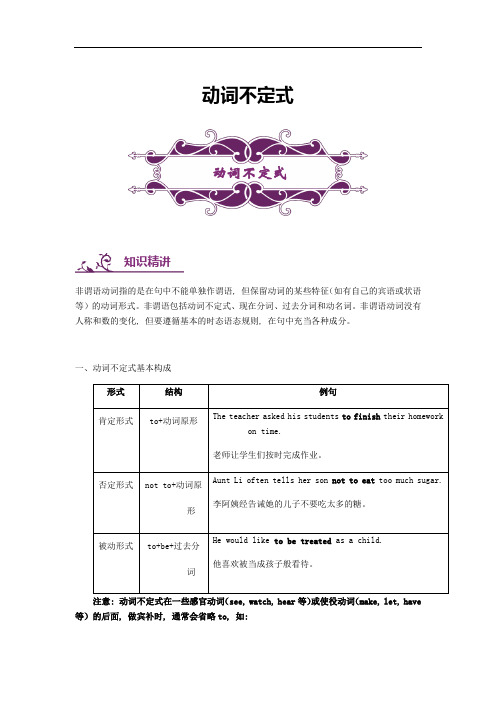
动词不定式非谓语动词指的是在句中不能单独作谓语, 但保留动词的某些特征(如有自己的宾语或状语等)的动词形式。
非谓语包括动词不定式、现在分词、过去分词和动名词。
非谓语动词没有人称和数的变化, 但要遵循基本的时态语态规则, 在句中充当各种成分。
一、动词不定式基本构成形式 结构 例句肯定形式to+动词原形The teacher asked his students to finish their homeworkon time.老师让学生们按时完成作业。
否定形式 not to+动词原形Aunt Li often tells her son not to eat too much sugar. 李阿姨经告诫她的儿子不要吃太多的糖。
被动形式 to+be+过去分词He would like to be treated as a child. 他喜欢被当成孩子般看待。
注意: 动词不定式在一些感官动词(see, watch, hear 等)或使役动词(make, let, have 等)的后面, 做宾补时, 通常会省略to, 如:动词不定式知识精讲The boss made me work ten hours a day.=I was made to work ten hours a day by the boss.这个老板让我一天工作十个小时。
二、动词不定式的语法功能动词不定式在句子中可充当主语、表语、宾语、宾补、定语和状语(即除谓语之外的各种成分)。
1.不定式作主语1).动词不定式短语作句子主语时,视为单数,谓语动词用第三人称单数,如:To make work more efficient is our goal.让工作更有效率是我们的目标。
2).不定式短语作主语时, 为了考虑句子的平衡, 常用it作形式主语, 而将真正的不定式主语放在句子后面, 结构为: It+is/ was+adj.(+for sb.)+动词不定式, 如上一句话也可写成:It’s our goal to make work efficient.我们的目标是让工作更有效率。
初中英语动词不定式、动名词专项练习(附答案)
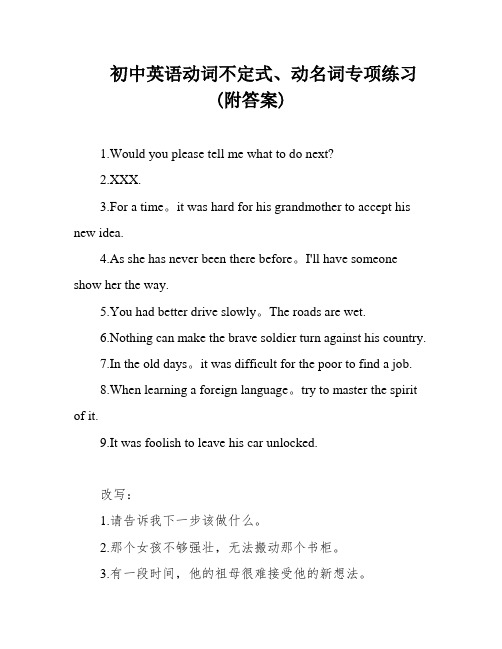
初中英语动词不定式、动名词专项练习(附答案)1.Would you please tell me what to do next?2.XXX.3.For a time。
it was hard for his grandmother to accept his new idea.4.As she has never been there before。
I'll have someone show her the way.5.You had better drive slowly。
The roads are wet.6.Nothing can make the brave soldier turn against his country.7.In the old days。
it was difficult for the poor to find a job.8.When learning a foreign language。
try to master the spirit of it.9.It was foolish to leave his car unlocked.改写:1.请告诉我下一步该做什么。
2.那个女孩不够强壮,无法搬动那个书柜。
3.有一段时间,他的祖母很难接受他的新想法。
4.因为她以前从未去过那里,所以我会让别人带她去。
5.你最好开车慢点,路上很湿。
6.没有什么能让勇敢的士兵背叛自己的国家。
7.在过去,穷人很难找到工作。
8.研究外语时,尽力掌握它的精神。
9.留下车子没有锁是很愚蠢的。
10.Remember to put back the newspaper when you have finished it.11.XXX as to be heard in front of his soldiers.12.n and。
have made it possible for us to know what is going on all over the world.13.I'll be very sorry to leave.14.I don't see how I could possibly manage to finish the work without being helped.15.We all think it most foolish of you to make this mistake.16.Because air n has been greatly ced。
初中语法之非谓语动词用法详解和练习
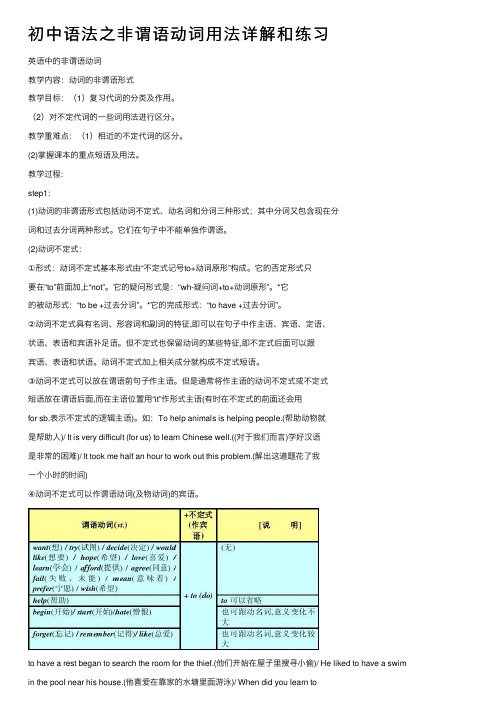
初中语法之⾮谓语动词⽤法详解和练习英语中的⾮谓语动词教学内容:动词的⾮谓语形式教学⽬标:(1)复习代词的分类及作⽤。
(2)对不定代词的⼀些词⽤法进⾏区分。
教学重难点:(1)相近的不定代词的区分。
(2)掌握课本的重点短语及⽤法。
教学过程:step1:(1)动词的⾮谓语形式包括动词不定式、动名词和分词三种形式;其中分词⼜包含现在分词和过去分词两种形式。
它们在句⼦中不能单独作谓语。
(2)动词不定式:①形式:动词不定式基本形式由“不定式记号to+动词原形”构成。
它的否定形式只要在“to”前⾯加上“not”。
它的疑问形式是:“wh-疑问词+to+动词原形”。
*它的被动形式:“to be +过去分词”。
*它的完成形式:“to have +过去分词”。
②动词不定式具有名词、形容词和副词的特征,即可以在句⼦中作主语、宾语、定语、状语、表语和宾语补⾜语。
但不定式也保留动词的某些特征,即不定式后⾯可以跟宾语、表语和状语。
动词不定式加上相关成分就构成不定式短语。
③动词不定式可以放在谓语前句⼦作主语。
但是通常将作主语的动词不定式或不定式短语放在谓语后⾯,⽽在主语位置⽤“it”作形式主语(有时在不定式的前⾯还会⽤for sb.表⽰不定式的逻辑主语)。
如:To help animals is helping people.(帮助动物就是帮助⼈)/ It is very difficult (for us) to learn Chinese well.((对于我们⽽⾔)学好汉语是⾮常的困难)/ It took me half an hour to work out this problem.(解出这道题花了我⼀个⼩时的时间)④动词不定式可以作谓语动词(及物动词)的宾语。
to have a rest began to search the room for the thief.(他们开始在屋⼦⾥搜寻⼩偷)/ He liked to have a swim in the pool near his house.(他喜爱在靠家的⽔塘⾥⾯游泳)/ When did you learn tospeak English?(你什么时候开始学英语的?)/ Don’t forget to close the door whenyou leave.(你离开时别忘了关门[⽐较] He forgot to turn off the light.(他忘了关灯.) (没关)/ He forgot turning off thelight.(他忘记关过灯.)(关了) /Please remember to ring me up.(记得给我打电话.)(还没打电话) / I remember calling you yesterday but you forgot.(我记得昨天给你打电话了,但是你忘记了.)(打过电话)He does not know which one to take./ Tell me how to get to the station.(告诉我怎么样去⽕车站)/ She asked me wh at to do for today’s homework.(她问我今天家庭作业做什么)/ Can you teach me how to search the internet?(你能教我怎样上⽹吗?) [C] 不定式作宾语⽽后⾯⼜有宾语补⾜语时,通常⽤it代替作形式宾语,⽽不定式则后置。
最新初中英语非谓语动词1动名词动词不定式讲解-练习
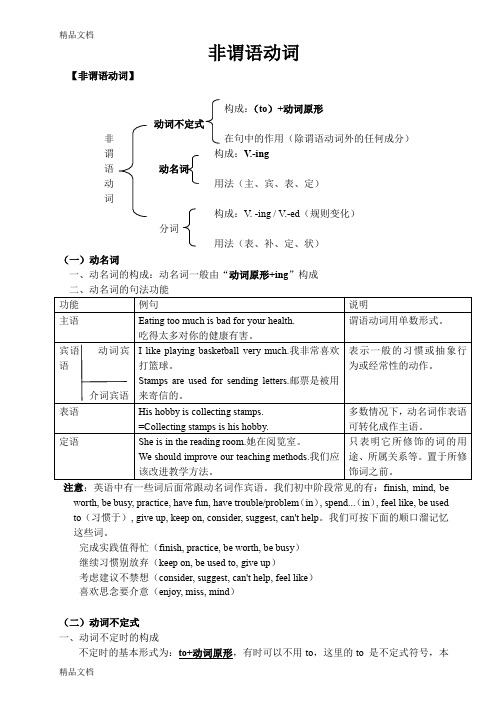
非谓语动词【非谓语动词】构成:(to)+动词原形动词不定式非在句中的作用(除谓语动词外的任何成分)谓构成:V.-ing语动名词动用法(主、宾、表、定)词构成:V. -ing / V.-ed(规则变化)分词用法(表、补、定、状)(一)动名词一、动名词的构成:动名词一般由“动词原形+ing”构成二、动名词的句法功能功能例句说明主语Eating too much is bad for your health.吃得太多对你的健康有害。
谓语动词用单数形式。
宾语动词宾语介词宾语I like playing basketball very much.我非常喜欢打篮球。
Stamps are used for sending letters.邮票是被用来寄信的。
表示一般的习惯或抽象行为或经常性的动作。
表语His hobby is collecting stamps.=Collecting stamps is his hobby. 多数情况下,动名词作表语可转化成作主语。
定语She is in the reading room.她在阅览室。
We should improve our teaching methods.我们应该改进教学方法。
只表明它所修饰的词的用途、所属关系等。
置于所修饰词之前。
注意:英语中有一些词后面常跟动名词作宾语。
我们初中阶段常见的有:finish, mind, be worth, be busy, practice, have fun, have trouble/problem(in), spend...(in), feel like, be used to(习惯于), give up, keep on, consider, suggest, can't help。
我们可按下面的顺口溜记忆这些词。
完成实践值得忙(finish, practice, be worth, be busy)继续习惯别放弃(keep on, be used to, give up)考虑建议不禁想(consider, suggest, can't help, feel like)喜欢思念要介意(enjoy, miss, mind)(二)动词不定式一、动词不定时的构成不定时的基本形式为:to+动词原形,有时可以不用to,这里的to 是不定式符号,本身无词义,动词不定式的否定形式是not+(to+)动词原形。
- 1、下载文档前请自行甄别文档内容的完整性,平台不提供额外的编辑、内容补充、找答案等附加服务。
- 2、"仅部分预览"的文档,不可在线预览部分如存在完整性等问题,可反馈申请退款(可完整预览的文档不适用该条件!)。
- 3、如文档侵犯您的权益,请联系客服反馈,我们会尽快为您处理(人工客服工作时间:9:00-18:30)。
初中英语动词不定式与动名词专项练习一、动词不定式的用法1)作主语To learn English well is not easy. 或It is not easy to learn English well.2)作表My wish is to become a teacher.3)作宾语Most of us like to watch football matches.4)作宾语补足语He told me to be here on time.5)作定语I have nothing to say about that thing.6)作状语He stopped to have a look.否定形式:not + to + 动词原形构成例如:He asked me not to make such a mistake.2、动词不定式与疑问词连用:例如:(1) He doesn’t know how to use the machine. (不定式作宾语)(2) How to use the machine is a question. (不定式作主语)(3) The question is when to go there. (不定式作表语)3、省to 的动词不定式1)使役动词let, have, make:2)感官动词see, watch, look at, notice, hear, listen to, smell, feel, find 等后作宾补,省略to。
3)would rather,had better + do4、不定式的特殊句型:1)too…to…:太…而不能…He is too excited to speak.2)enough to do:足以做…The child is old enough to go to schooll3)Why not +动词原形"表达向某人提出建议Why not take a holiday?4)so as (not) to do: 表示目的Go in quietly so as not to wake the baby.二、动词的-ing形式:1.动词的-ing形式用作动名词:1)动名词作主语Walking is good exercise. 走路是很好的运动2)动名词作表语My favorite sport is swimming. 我最喜欢的运动是游泳。
3)动名词作宾语She can’t help crying at a sad movie. 她看了忧伤的电影禁不住要哭。
有些动词和动词短语后只能接动名词作宾语。
例如:, finish, mind, practice, be good at, do well in, can't help(禁不住), keep on, feel like, look forward to, enjoy ,finish, be busy ,advise ,suggest等2.动词的-ing形式用作现在分词:-ing分词通常用作宾语补足语,表示动作正在发生或者正在进行。
这种用法通常用在下列动词中:see, hear, find, smell, watch, find, listen to, look at, notice, 例如:1)There we found him watching TV. 我们发现他在那儿看电视。
2)I heard someone knocking at the door. 我听见有人在敲门。
1. She reached the top of the hill and stopped _______ on a big rock.A. to have restedB. restingC. to restD. rest2. Do you know the boy _______ under the big tree?A. layB. lainC. layingD. lying3.The students are busy _______ ready for the exam now.A. gettingB. getC. gotD. to get4. --- Look! The lights in the classroom are still on. --- Oh, I forgot _______.A. turning them offB. turn them offC. to turn them offD. having turned them off5. He didn’t feel like _______ out for a walk, because he had caught a cold.A. to goB. goesC. goneD. going6. You’d better _______ at home all the time. It’s bad for your health.A. don’t stayB. no to stayC. not stayD. not staying7.. The mother asked the boy _______ down the ladder, but he went on_______ instead.A. come; climbingB. to come; to climbC. to come; climbingD. coming; climbing8. Is there any time _______ to the museum?A. goingB. to goC. goesD. gone9. The teacher asked the students to close the windows ____the wind from____the papers away.A. to stop; blowingB. stopping; blowingC. to stop; blowD. stopped; blow10. We should do as much as we can _______ water.A. for savingB. to saveC. saveD. saved11. What is the best way do you think ______ the wild animals?A. protectingB. to protectingC. protectedD. to protect12. I think it kind _______.A. of him to help meB. for him to help meC. that he help meD. of him helping me13. It’s too hot today. Why not _______ your coat?A. take onB. to take offC. take offD. taking off14. Boys, don’t forget _____ the windows before you leave the classroom.A. closingB. closedC. to closingD. to close15. Would you please _______ any noise? The baby has just fallen asleep.A. makeB. to makeC. not to makeD. not make16. --- Would you please try _______ late again? --- Sorry, I won’t be late again.A. not to beB. to be notC. not beD. be17. Yesterday I heard a story _______ by my friend.A. toldB. tellingC. to tellD. tell18. We can’t help crying after _______ the sad news.A. hearB. heardC. hearingD. to hear19. --- Would you mind _______ for a few minutes? --- No, not at all.A. waitB. to waitC. waitedD. waiting20. I find _______ him all about it.A. necessary to tellB. that necessary toC. necessary it to tellD. it necessary to tell21. It’s very nice _______ you to _______ me about it.A. for; tellB. of; sayC. to; speakD. of; tell22.. The son wants his mother _______ him up at six o’clock every day.A. to ringB. ringC. ringsD. ringing23. --- I often use Hotmail to send e-mails.--- Really? Would you please show me _______ it?A. how can I useB. what can I usC. how to useD. what to use24.. Tell the boy _______ out of the window.A. not to lookB. to not lookC. don’t lookD. not look25. Did you hear her _______ in the next room just now?A. singingB. singC. to singD. sang26. How long does it take you _______ your homework every evening?A. finish doingB. finishing to doC. to finish doingD. finish to do27. Remember _______ the lights when you leave the office.A. to turn offB. turning offC. turn offD. to turning off28. Her hope _______ the 2008 Olympic Games.A. to take part inB. is to take part inC. taking part inD. will take part in29.The room isn’t big enough _______ so many people.A. holdingB. holdC. to holdD. holds30. You’d better not spend more time _______ computer games.A. for playingB. in playingC. to playD. plays31. It is better to teach a man fishing than _______ him fish.A. givingB. to giveC. givesD. give32. My sister is interested in _______ in her free time.A. watch TVB. reading booksC. listening musicD. plays basketball33. I have caught a cold and I don’t feel like _______ anything.A. to eatB. eatingC. ateD. eats34. I saw him _______ into the small store.A. wentB. goingC. to goD. has gone35. He raised(提高) his voice(嗓音)to make everybody in the room ______ him clearly.A. hearB. to hearC. hearingD. heard36. I didn’t go to the park yesterday because my mother asked me _______ my sister at home.A. to look atB. to look forC. looking afterD.to take care of37. Their wish is _____ a house of their own.(他们自己的)A. to haveB. for havingC. haveD. of having38. The teacher agreed _____ us_____ the test papers home.A. to let, takeB. to let, to takeC. letting, takeD. let, take39. When he saw I was in a hurry, he offered _______ me his bicycle.A. lendingB. lentC. to lendD. in lending40. I don't like_______ people _________about their neighbours.A. hear, talkingB. to hear, talkingC. to hear, to talkD. hearing, talkedB.用括号内所给动词的适当形式填空,使句子完整、正确。
